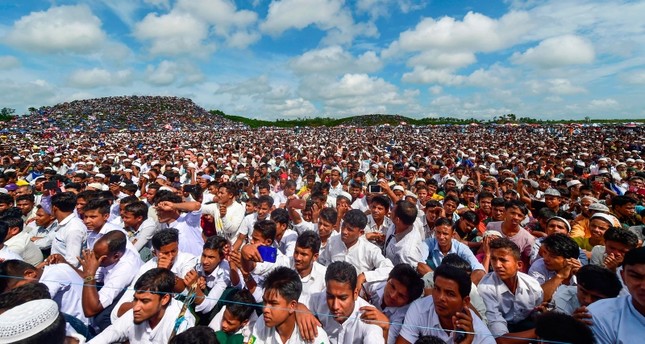- The Rohingya are a Muslim ethnic minority in Myanmar, most of whom live in Rakhine state, and have their own language and culture
- Despite living in Myanmar for generations, they are not recognized as citizens or counted in the census.
Fleeing tortures and persecutions two years ago, tens of thousands of Rohingya Muslims held demonstrations Sunday in their refugee camps in Bangladesh calling for Myanmar to grant them citizenship, The BBC reported.
“We have asked the Burmese (Myanmar) government for dialogue. But we haven’t got any response from them yet,” Rohingya leader Mohib Ullah said.
“We were beaten, killed and raped in Rakhine. But still that is our home. And we want to go back.”
Myanmar instead considers them to be illegal immigrants from Bangladesh.
On Aug. 25, 2017, Burma launched a major military crackdown on the Muslim ethnic minority, killing almost 24,000 civilians and forcing 750,000 others to flee to Bangladesh, according to the Ontario International Development Agency (OIDA).
Horrific accounts of murders, rapes, torture, and indiscriminate shelling are allegedly committed by the Burmese army against the Rohingya people of west Burma as well as other minority groups.
Islamic schools and houses of worship were torched in the crackdown by Burma troops and Buddhist gangs that UN fact-finders said amounted to crimes against humanity and genocide against the Rohingya.

After two years in refugee camps, Bangladesh set up a voluntary return scheme on Thursday but not a single Rohingya decided to leave.
“I came from Burma, unable to tolerate the torture there, so I came to Bangladesh,” Ali Akbar told Reuters from his phone repair and recharge stall.
“Coming here I have started this business, I am happy here.”
They also refuse to abandon their rights in their home country.
“I have come here to seek justice for the murder of my two sons. I will continue to seek justice till my last breath,” 50-year-old Tayaba Khatun told AFP news agency.
In its report, Forced Migration of Rohingya: The Untold Experience, the OIDA increased the estimated number of murdered Rohingya to 23,962 (±881) from an earlier Doctors Without Borders figure of 9,400.
More than 34,000 Rohingya were also thrown into fires, while over 114,000 others were beaten, the OIDA report said, adding that 17,718 (±780) Rohingya women and girls were raped by the Burmese army and police.
More than 115,000 Rohingya houses were burned and 113,000 others were vandalized, it added.